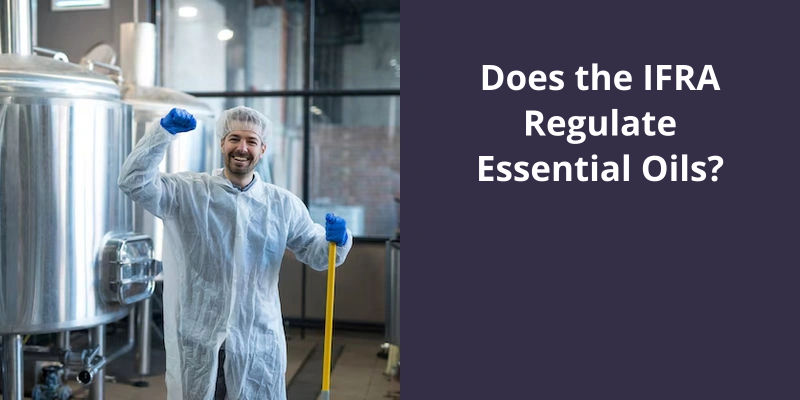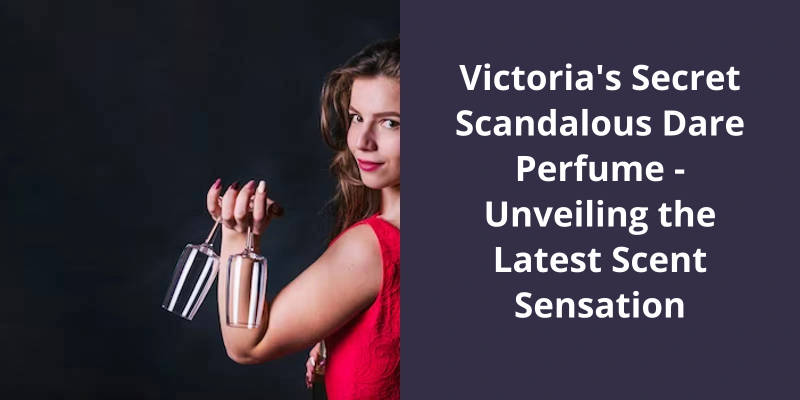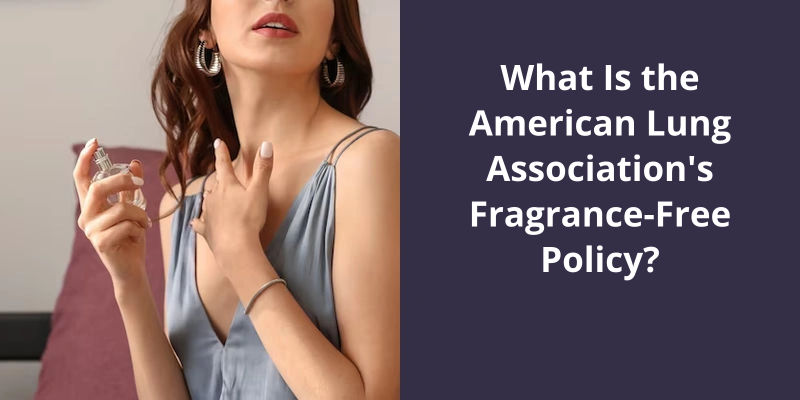The International Fragrance Association (IFRA) does regulate essential oils. IFRA sets safety standards for natural and synthetic aroma compounds, including essential oils, to ensure their safe use in various industries like cosmetics and food. These standards are based on scientific data and research, which determine the maximum quantity of certain oils that can be used in products. Essential oil producers and users are guided by these standards to ensure that they can provide their customers with safe products.

Does IFRA Apply to Essential Oils?
When it comes to essential oils, IFRA guidelines do apply. The IFRA standards follow a strict set of guidelines that take into account potential risks and allergenicity of different fragrance materials. It’s important to note that while essential oils are natural, they’re still considered fragrance materials and can pose some risks if not used correctly.
For example, bergamot essential oil contains a phototoxic compound that can cause skin irritation or burn if used in high concentrations or when exposed to sunlight. IFRA regulations aim to limit this risk by setting a maximum allowable concentration of bergamot essential oil in body-care products.
These are materials that have been identified as posing a higher risk of causing skin irritation or other adverse reactions. When included in a body-care product, these materials must be used at a limited concentration or avoided altogether. Essential oils such as cinnamon bark or clove bud fall into this category and are subject to specific restrictions.
It’s worth mentioning that IFRA regulations aren’t legally binding, but most cosmetic and personal care companies voluntarily follow them. Many industry professionals consider compliance with IFRA guidelines to be a best practice in the production of body-care products. Additionally, IFRA regularly updates it’s guidelines as new research becomes available, so it’s important for companies to stay up-to-date with the latest information.
The aim of these regulations is to ensure the safe use of fragrance materials and reduce the risk of skin irritation or other adverse reactions. As always, it’s important for companies to stay informed of the latest updates and research regarding essential oil use and safety.
How Do IFRA Regulations Affect Natural Skincare and Beauty Products?
- IFRA regulations limit the use of certain ingredients in skincare and beauty products
- Natural skincare and beauty products may need to reformulate or stop using certain ingredients in order to comply with IFRA regulations
- Some natural ingredients may be restricted or banned under IFRA regulations, even though they’re considered safe by advocates of natural skincare and beauty
- IFRA regulations aim to protect consumers from potential risks associated with certain ingredients, but some argue that they also limit innovation and may not be based on the latest scientific evidence
- Complying with IFRA regulations can be challenging and costly for natural skincare and beauty companies, but it’s also important for building trust with consumers and ensuring product safety
The International Fragrance Association (IFRA) works towards the safety of consumers by ensuring that fragrances are made with safe ingredients. In order to do so, IFRA has banned certain chemicals that can cause harm to the skin or the environment. Some of the chemicals that are banned by IFRA include action cade, calamus oil, fig leaf absolute and horseradish oil. Additionally, they’ve imposed limitations on the usage of some oils such as bitter orange oil, cassia oil, Chinese cinnamon and cinnamon bark. Let’s take a closer look at how IFRA regulates the fragrance industry and ensures the safety of it’s consumers.
What Chemicals Are Banned in IFRA?
When it comes to regulations for the cosmetics and fragrances industry, one of the most important governing bodies is the International Fragrance Association (IFRA). One of the ways they do this is by listing chemicals that are completely banned from use in fragrances, no matter their quantity or purpose.
Some of the chemicals banned by IFRA include action cade, which is extracted from juniper trees and can cause severe skin irritation. Calamus oil, which comes from a type of swamp plant, is banned because it contains a carcinogenic compound. Fig leaf absolute and horseradish oil are also banned due to the potential for allergic reactions. The use of these banned chemicals is strictly prohibited in any fragrances meant for sale.
In addition to outright bans, IFRA also limits the use of certain chemicals in fragrances. For example, the use of certain oils, such as bitter orange oil and cassia oil, is restricted because they can cause skin sensitization and even allergic reactions in some people. Chinese cinnamon and cinnamon bark are also limited in use, as they contain high levels of a chemical called coumarin, which can be harmful in large quantities.
Another chemical banned by IFRA is mustard oil. This oil comes from the seeds of the mustard plant and is often used in cooking and medicinal remedies. However, in fragrances, it can be problematic due to it’s strong and potentially irritating odor. The use of black mustard and stryax gum is also banned, as both can cause skin sensitization and other adverse effects.
This oil is derived from the roots of the sassafras plant and has been used in traditional medicine and cooking for centuries. However, it’s considered a carcinogen and can cause liver damage in large quantities.
By restricting or banning the use of certain chemicals and oils, they help to prevent adverse reactions and ensure that fragrances can be enjoyed by all without causing harm.
Source: The IFRA is the International Fragrance Association
Conclusion
It’s important to note, however, that the IFRA regulations aren’t binding and therefore rely heavily on industry compliance. The use of essential oils should be approached with caution and it’s important to understand the potential risks associated with their use.





